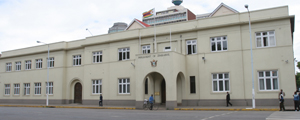
As expected, this week saw the Constitution of Zimbabwe Amendment (No 20) Bill being introduced in the House of Assembly. After being passed by the House of Assembly, it will be transmitted to the Senate which is most likely to fast-track it before being signed into law by the President.
In the House with John Makamure
While the passage of the Bill is significant in the sitting calendar of Parliament, this should never be seen as the panacea to a free and fair election. Parliament and other key players still have a lot of work to do to ensure a conducive environment is created for a credible electoral process.
Minister Eric Matinenga, the mover of the Bill, sought approval of the House to fast-track the Constitutional Bill. Fast-tracking is when more than one stage of the Bill is taken at the same sitting. Normally, a Bill has to be gazetted and then notice given by the mover of the Bill to table it in the House.
When such notice has been approved, the Bill will be read for the first time and then referred to the Parliamentary Legal Committee (PLC) to given an opinion on whether or not any provisions of the draft legislation violates the Constitution. A Constitutional Bill is, however, not referred to the PLC. The Bill stands referred to the relevant portfolio committee upon gazetting. The portfolio committee shall consider the Bill and has power to call for and receive evidence from the public on that Bill.
The committee will present its report containing its deliberations and recommendations at second reading stage of the Bill. This has to be done within 14 business days.
After second reading, the Bill is committed to a committee of the whole House which will consider it clause by clause. The committee of the whole House has power to make amendments to a Bill. After this stage the Bill goes for third reading. After third reading, the Bill shall be deemed to have been passed by the House and then transmitted to the other House, where it goes basically through the same stages.
What I have outlined above is suspended when there is fast-tracking of legislation. My argument is that while lawful according to the rules of Parliament, it is not good parliamentary practice to fast-track legislation.
- Chamisa under fire over US$120K donation
- Mavhunga puts DeMbare into Chibuku quarterfinals
- Pension funds bet on Cabora Bassa oilfields
- Councils defy govt fire tender directive
Keep Reading
Even if the draft Constitution was overwhelmingly approved at a referendum, there is nothing wrong in giving the MPs enough time to debate the Bill and for the public to contribute to the debate. Increased public debate will allow citizens to further understand the content of the supreme law that will govern them. The truth of the matter is that most people voted yes for the draft Constitution without having read even a single paragraph. Allowing Parliament more time to debate the Bill would have been an excellent opportunity for more people to be educated on the national charter.
I also do not buy the argument that Members of Parliament should not propose further substantial amendments to the draft Constitution just because it was approved at a referendum. MPs are representatives of the people. Therefore any proposals to make the Constitution a better document should be most welcome.
Of course it would be wrong for the MPs to amend the fundamental issues in the new Constitution such as the Bill of Rights. But if there are important omissions such as the establishment of an independent Parliamentary Service Commission to regulate the conditions of service for members and staff, then Parliament should propose those amendments. There is no need to rush. Parliament only stands dissolved on June 29, giving the legislators more than six weeks to debate the draft Constitution and ensure a good supreme law is enacted. The amendments that were effected by the House of Assembly are only grammatical and not substantive enough.
And it is not only the passage of the Constitutional Bill that will guarantee a free and fair election. We can have a very good Constitution, but still a violent and contested election outcome. This is because those controlling the levers of political power can violate the Constitution with impunity. We need the rule of law to prevail for the Constitution to be relevant. It has to be enforced – otherwise it can still gather dust after being signed into law by the President and gazetted.
The job of Parliament is not over after passing the Constitutional Bill. Parliament still has a huge task to align all the laws governing elections with the new Constitution.
We should also take note of Schedule Six to the draft Constitution that requires the Registrar-General of Voters, under the supervision of the Zimbabwe Electoral Commission, to conduct a special and intensive voter registration and a voters’ roll inspection exercise for at least 30 days after the publication of the new Constitution in the Government Gazette.
This means after passage in both Houses and signing into law by the President, the new Constitution has to be published in the Government Gazette, paving the way for this intensive voter registration and inspection exercise. This is most likely to happen before Parliament stands dissolved on June 29. So the legislative branch has an important responsibility to provide oversight on this important exercise.
John Makamure is the Executive Director of the Southern African Parliamentary Support Trust writing in his personal capacity. Feedback: [email protected]











